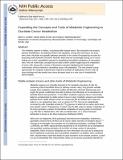| dc.contributor.author | Fendt, Sarah-Maria | |
| dc.contributor.author | Stephanopoulos, Gregory | |
| dc.contributor.author | Keibler, Mark Andrew | |
| dc.date.accessioned | 2014-11-13T19:52:35Z | |
| dc.date.available | 2014-11-13T19:52:35Z | |
| dc.date.issued | 2012-10 | |
| dc.date.submitted | 2012-08 | |
| dc.identifier.issn | 87567938 | |
| dc.identifier.issn | 1520-6033 | |
| dc.identifier.uri | http://hdl.handle.net/1721.1/91560 | |
| dc.description.abstract | The metabolic engineer's toolbox, comprising stable isotope tracers, flux estimation and analysis, pathway identification, and pathway kinetics and regulation, among other techniques, has long been used to elucidate and quantify pathways primarily in the context of engineering microbes for producing small molecules of interest. Recently, these tools are increasingly finding use in cancer biology due to their unparalleled capacity for quantifying intracellular metabolism of mammalian cells. Here, we review basic concepts that are used to derive useful insights about the metabolism of tumor cells, along with a number of illustrative examples highlighting the fundamental contributions of these methods to elucidating cancer cell metabolism. This area presents unique opportunities for metabolic engineering to expand its portfolio of applications into the realm of cancer biology and help develop new cancer therapies based on a new class of metabolically derived targets. | en_US |
| dc.description.sponsorship | German Science Foundation | en_US |
| dc.description.sponsorship | National Institutes of Health (U.S.) (Grant 1R01 DK075850-01) | en_US |
| dc.description.sponsorship | National Institutes of Health (U.S.) (Grant R01 CA160458) | en_US |
| dc.language.iso | en_US | |
| dc.publisher | Wiley Blackwell | en_US |
| dc.relation.isversionof | http://dx.doi.org/10.1002/btpr.1629 | en_US |
| dc.rights | Creative Commons Attribution-Noncommercial-Share Alike | en_US |
| dc.rights.uri | http://creativecommons.org/licenses/by-nc-sa/4.0/ | en_US |
| dc.source | PMC | en_US |
| dc.title | Expanding the concepts and tools of metabolic engineering to elucidate cancer metabolism | en_US |
| dc.type | Article | en_US |
| dc.identifier.citation | Keibler, Mark A., Sarah-Maria Fendt, and Gregory Stephanopoulos. “Expanding the Concepts and Tools of Metabolic Engineering to Elucidate Cancer Metabolism.” Biotechnology Progress 28, no. 6 (October 18, 2012): 1409–1418. | en_US |
| dc.contributor.department | Massachusetts Institute of Technology. Department of Chemical Engineering | en_US |
| dc.contributor.mitauthor | Keibler, Mark Andrew | en_US |
| dc.contributor.mitauthor | Fendt, Sarah-Maria | en_US |
| dc.contributor.mitauthor | Stephanopoulos, Gregory | en_US |
| dc.relation.journal | Biotechnology Progress | en_US |
| dc.eprint.version | Author's final manuscript | en_US |
| dc.type.uri | http://purl.org/eprint/type/JournalArticle | en_US |
| eprint.status | http://purl.org/eprint/status/PeerReviewed | en_US |
| dspace.orderedauthors | Keibler, Mark A.; Fendt, Sarah-Maria; Stephanopoulos, Gregory | en_US |
| dc.identifier.orcid | https://orcid.org/0000-0002-5410-6543 | |
| dc.identifier.orcid | https://orcid.org/0000-0001-6909-4568 | |
| mit.license | OPEN_ACCESS_POLICY | en_US |
| mit.metadata.status | Complete | |
